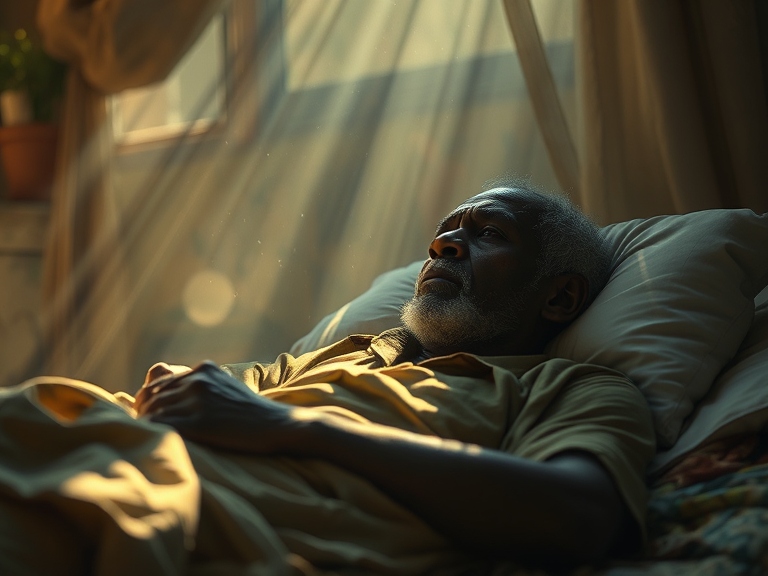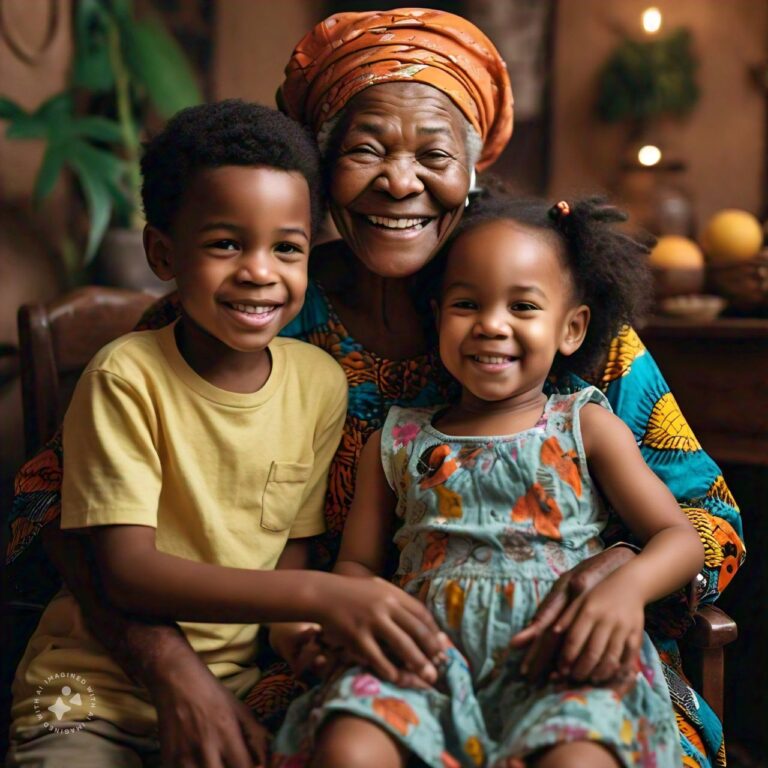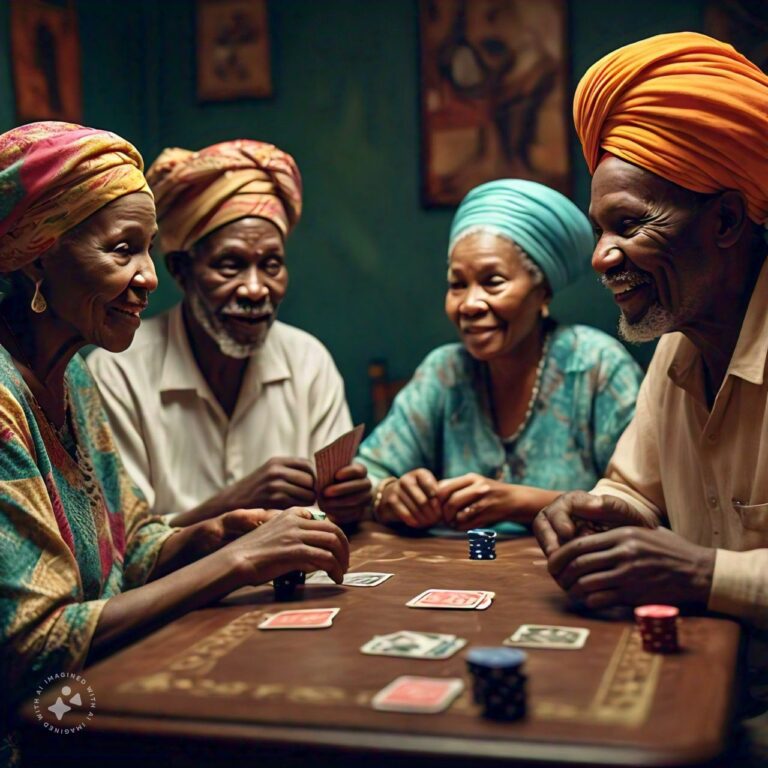
The streets of Ile-Ara were dark and still, save for a faint light flickering from Mama Titi’s stall, the unofficial headquarters of the “Old Boys Watch.” It was way past closing time, but Mama Titi always left a spare key hidden under an old clay pot for her trusted “old boys.”
They let themselves in quietly, dusted the tables, and dished out the pepper soup she always left in a cooler for them. They’d always clean up and lock up before the first hint of dawn.
Tonight, like most nights, the group had gathered to keep away the sleep that had long deserted them. Chief Okon sat with his ever-present walking stick, eyes squinting as he watched Baba Rauf shuffle a well-worn deck of cards.
As impeccably dressed as ever, Alhaji Sule nursed his steaming bowl of pepper soup, muttering, “Ah-ah! Mama Titi sabi cook.”
Grandpa Tunde, eyes bright despite the hour, busied himself, setting up the draft board with an exaggerated huff.
“Old men, don’t think you’ll beat me tonight,” he teased, flashing a grin.
Chief Okon chuckled. “You say that every night, and every night you lose, young man,” he shot back, tapping his cane. Despite his age, Chief had a sharp wit, which made him a formidable draft opponent.
Always calm and calculating, Alhaji Sule took a slurp of his soup, chewing on a well-seasoned piece of goat meat, when he asked, “Rauf, you look troubled. Is something on your mind?”
Baba Rauf, known for his loud voice and even louder laugh, shifted uncomfortably. He gave a half-hearted shrug, but his usually booming voice dropped to a murmur. “My young wife, no be small wahala o! She say I dey disturb her sleep.”
A small, knowing murmur went through the group. Chief Okon chuckled, “And what were you expecting, eh, Rauf? You, a man of seventy-three, married to a girl who was born in the ’70s?” He slapped his knee, and the men joined in the laughter.
But Baba Rauf didn’t join in. “Ah, it’s not only the age gap. I’ve been restless these days; I can’t sleep properly. And every time I manage to close my eyes, something jerks me awake. She complains of me tossing and turning like I’m in a wrestling match.” He sighed, rubbing his tired eyes. “Now, most nights, she banishes me to the parlour, say she need her beauty sleep.”
Grandpa Tunde shook his head with a chuckle. “Ah-ah, Baba Rauf, but that’s partly why you married her. For her beauty? Well, let her rest, then!” he said with a grin, earning himself a playful jab from Chief Okon.
“Mtcheew, let me hear the word, Tunde,” Baba Rauf huffed, though his lips quirked with a reluctant smile. “Who knew getting older would mean becoming so restless?”
“Restless? More like sleepless,” Alhaji Sule muttered. “We all know that feeling, don’t we?” He leaned back, looking up at the stars. “Somehow, sleep is the first thing that abandons you as you get older. That’s why we’re out here every night, pretending to play cards when we’re really keeping vigil.”
The men grew quiet, each reflecting on sleepless nights and shifting routines. Chief Okon broke the silence, clearing his throat. “You’re not alone in this, Rauf. My nights are the same. And I’m sure Alhaji Sule here hasn’t had a decent rest in years, eh?”
Alhaji Sule nodded, his face stoic. “True, Chief. A long time now. Even Mama Pastor says it’s the work of ‘spiritual forces,’ but I tell her it’s simply age.”
They laughed, even as a touch of melancholy lingered in their voices. This “Old Boys Watch” gathering wasn’t just a group of friends playing cards in the dead of night. It was a shared understanding, a solace found in each other’s company as they chased after sleep together.
After a pause, Grandpa Tunde clapped his hands, breaking the mood. “Well, tonight, I’m here to take every one of your old naira notes in this draft game!” he said with his signature grin. He slapped the draft board with enthusiasm, rallying the men’s spirits.
Their laughter filled the empty street, echoing through the quiet town. Baba Rauf managed a laugh, looking at his friends with grateful eyes. Despite his sleepless nights and restless heart, here, with the Old Boys Watch, he found comfort in the familiar faces that understood him, restless or not.
Loss is inevitable the older we get: Loss of youth, loved ones, eyesight, and even sleep. While seniors need a solid 7-8 hours each night to stay healthy, many struggle to achieve it in one stretch. In fact, 50% of individuals over 55 years old have trouble falling and staying asleep, often due to various physical, psychological, and lifestyle factors. These disturbances can make nights feel long and restless, leaving seniors tired during the day. Let’s explore some common causes of sleep issues among seniors and a few specific sleep disorders that impact them.

Causes of Sleep Disorders in the Elderly
- Health conditions
As mentioned earlier, sleep disorders in a senior could be a result of an illness. These health conditions can be physical or psychological, and lack of sleep may be a by-product of their effects on the older adult. Some of these conditions are Chronic pains, Alzheimer’s disease, Parkinson’s disease, Cardiovascular disease, poor bladder control, and lung or respiratory conditions. These conditions can make it difficult to get comfortable, leading to poor sleep quality or interrupted sleep.
- Medications
Unfortunately, some medications seniors rely on for health can have side effects that disrupt sleep. Medications for blood pressure (antihypertensives), Parkinson’s (like levodopa), Alzheimer’s (like donepezil), and antidepressants or anti-anxiety drugs can interfere with sleep cycles. Sometimes, even changing the dosage or timing of a medication affects sleep. It’s helpful to review medications with a healthcare provider to understand side effects and ensure they’re taken at the correct times.
- Consumptions
Alcohol, smoking and caffeine are known to contribute to sleep difficulties. According to research, nicotine and caffeine disrupt the body’s circadian rhythm. The circadian rhythm is your body’s internal clock that controls when you feel awake and when it’s time to sleep. Disruptions can cause sleep problems, low energy, and mood changes.
On the other hand, alcohol may lead you to fall asleep faster, but it also often causes wakefulness in the middle of the night. Seniors can improve their sleep (and overall health) by eliminating nicotine, as well as enjoying caffeine and alcohol responsibly – well before bedtime.
- Poor sleeping habits
While naps can be refreshing, long or irregular naps during the day can make it hard to fall asleep at night. Encouraging seniors to stay active during the day can improve nighttime sleep and create a more regular sleep schedule.
Sleep Disorders in the Elderly
- Sleep apnea
Sleep apnea temporarily stops breathing during sleep, causing the brain to wake the person up for air. There are two types: obstructive sleep apnea, caused by relaxed throat muscles blocking airflow, and central sleep apnea, where the brain fails to signal the muscles that control breathing. Symptoms include loud snoring, morning headaches, insomnia, dry mouth, daytime drowsiness, and irritability.
Sleep apnea is often linked to obesity, age, smoking, alcohol, and health conditions like allergies. Seniors with sleep apnea can benefit from lifestyle changes like losing weight, reducing alcohol intake, stopping smoking, and being more active.
- REM behaviour disorder (RBD)
REM behaviour disorder, also known as rapid eye movement sleep behaviour disorder, is a disorder mostly found in seniors that causes people to physically act out their dreams, which can be disruptive and even dangerous.
This disorder may make seniors talk, thrash, or even fall out of bed while dreaming. Typically, muscles are temporarily paralysed during dreams to prevent these actions, but with RBD, this paralysis doesn’t happen. Caregivers can make the sleeping area safer by moving sharp objects away, placing the mattress on the floor to soften any falls, and adding bedrails around the bed.
- Circadian rhythm sleep disorders
Circadian rhythm sleep disorders occur when the body’s internal clock is out of sync, making it difficult to sleep and wake up. This can lead to trouble falling asleep at night and excessive daytime drowsiness.
Limited sunlight exposure, indoor lifestyles, and natural age-related changes can all contribute to these disorders. Maintaining a consistent daily routine, getting sunlight in the morning, and limiting evening screen time can help. If more support is needed, light therapy or melatonin supplements might be helpful under a doctor’s guidance.
- Insomnia
Insomnia is the difficulty of falling asleep, staying asleep, or waking up too early and being unable to go back to sleep. It’s common among seniors and affects mood, memory, and energy. Insomnia can stem from health conditions, medications, or poor sleep habits. Creating a consistent bedtime routine, a comfortable sleep environment, and avoiding caffeine or heavy meals before bed can help. A doctor or sleep specialist can provide additional options if insomnia persists.
- Restless leg syndrome (RLS),
Restless Leg Syndrome (RLS) is when seniors feel an irresistible urge to move their legs, especially at night. This leads to discomfort and disturbed sleep.
Symptoms include a crawling, tingling, or aching sensation in the legs temporarily relieved by movement. Seniors with RLS should avoid caffeine and alcohol, exercise regularly, and stretch before bed. A warm bath or massage can also be soothing; in severe cases, medication may be recommended.
Effects of Sleep Disorders in the Elderly
Sleep disorders can significantly impact seniors’ overall well-being, leading to fatigue, memory problems, increased risk of falls, and even mood changes. Poor sleep can weaken the immune system and contribute to chronic health issues, so addressing sleep problems early is important.
Managing Sleep Disorders in the Elderly
- Keep a sleep diary: This is a good one because it could help track when the senior feels tired, sleeps, and naps. This information would later help to identify any issues (e.g., if tiredness is linked to medications or foods) and establish a healthy sleep routine.
- Establishing a routine: A regular sleep schedule helps seniors maintain their body’s internal clock.
- Improving the sleep environment: A dark, quiet, cool room encourages restful sleep.
- Staying active: Gentle exercise throughout the day boosts energy and supports health.
- Seeking professional advice: Consulting with a healthcare provider can be helpful, especially if medications or health conditions are involved.
Conclusion
Growing older may come with unique sleep challenges, but seniors can enjoy a better night’s rest with a few mindful adjustments and some support. Creating a peaceful sleep environment and managing health factors can make a big difference, helping seniors wake up feeling refreshed and ready for the day.
At @Ìtọ́jú, we have safe and comfortable ensuite rooms with adjustable framed beds for added protection so your loved one can get a good night’s rest. For more information on disorders common among the elderly and how to care for them, feel free to contact us.



